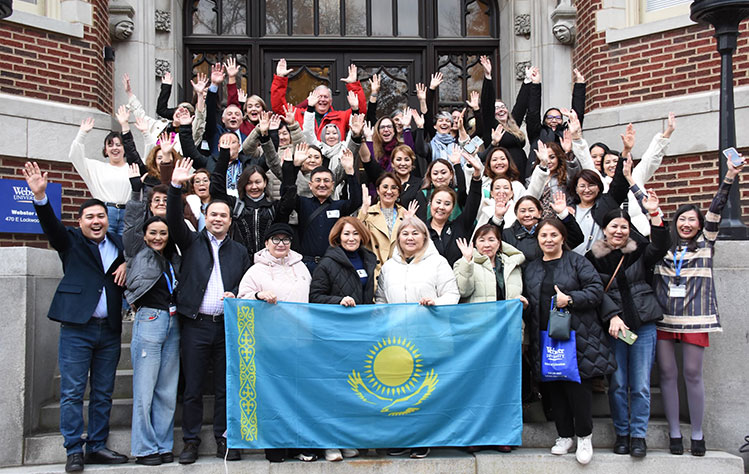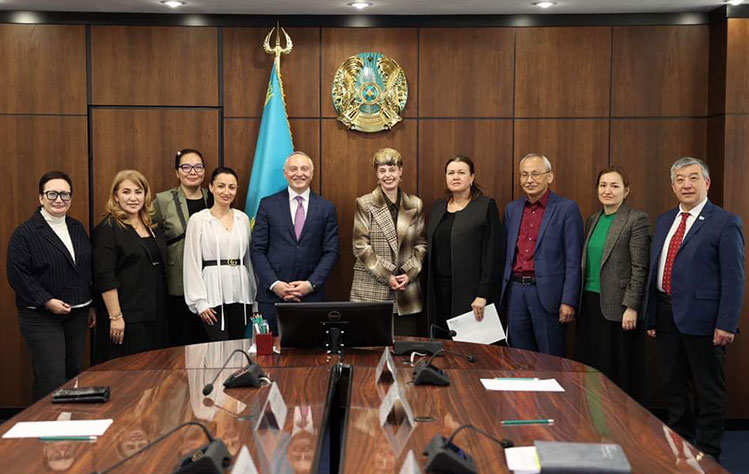Webster University School of Education Supporting Inclusive Education Efforts in Kazakhstan
April 10, 2024
 Photo: A cohort of educators from Kazakhstan visit with faculty and staff from Webster
University's School of Education in December 2023.
Photo: A cohort of educators from Kazakhstan visit with faculty and staff from Webster
University's School of Education in December 2023.
Webster University’s School of Education is known in the region for its high-quality preparation of special educators, offering both teacher preparation and advanced graduate programs in Special Education. That reputation is now international.
Stephanie Mahfood, interim dean of the School of Education, and the faculty and staff in the School of Education hosted a delegation of 30 education professionals from Kazakhstan in December for a week-long training in inclusive practices to support the education of students with disabilities. The visit was spurred by an official strategic government vision in Kazakhstan “to ensure equal access of all participants in the educational process to the best educational resources and technologies.” Officials were introduced to Mahfood through a mutual colleague who knew of Mahfood's background in special education and inclusive practices and the School of Education's robust reputation in preparing special educators.
A second delegation and three Kazakh ministry officials will visit Webster next week for another round of training. Future cohorts are also being planned through next year.
“It is imperative that as we design these training activities for our Kazakh participants, we do so in a way that models best practices in inclusion, which is why all our lessons are translated into Russian. We teach about inclusion by modeling inclusive practices. Ensuring synchronous translation and the availability of training and logistical materials in Russian is a central component to creating and inclusive environment,” Mahfood said. “I’m proud to say that in the follow-up surveys completed by our December delegation, participants collectively remarked on how the School of Education team created a learning experience that was welcoming, supportive, and purposeful in meeting their learning needs.”
During the training, participants engaged in training sessions with the School of Education faculty and visited local schools and advocacy groups to see inclusive practices in action. Topics included special education history, legislation, and practice in the U.S., transdisciplinary teaming, building peer and family supports, assessment, instructional differentiation and adaptation, and assistive technology supports. Currently, participants and their selected colleagues from this visit are engaging in a series of follow-up online modules that dive deeper into the topics addressed during the U.S. visit.
 Photo: Mahfood visits the Kazakhstan vice minister of education during a trip in March
2024.
Photo: Mahfood visits the Kazakhstan vice minister of education during a trip in March
2024.
The second visit scheduled for April comes on the heels of Mahfood’s visit to Kazakhstan in mid-March. During her visit, Mahfood visited three cities – Astana, Shymkent City, and Turkistan - and met with educators and educational leaders. Mahfood met with ministry officials including the vice minister of Education and the mayor of Turkistan to discuss Webster’s training program and opportunities for future collaborations. Mahfood was also able to connect with many of the educators who participated in the December delegation to discuss the impact of Webster’s training on their school community, challenges, and future support needs.
“Kazakhstan has made the inclusion of students with disabilities a national priority, with the government setting ambitious targets to make their schools inclusive,” Mahfood said. “The country has made great strides, but faces challenges including societal attitudes, ensuring educators and school leaders have robust training and support, and meeting the needs of all students and families within Kazakhstan’s vast, mountainous geographical area.”
Despite these challenges, Mahfood is excited about how Webster’s School of Education can play a strategic role in the education of students with disabilities across the world. “Our special education faculty are some of the most creative, dedicated, talented professionals I have had the pleasure of working with. They are highly academically credentialed, but more importantly, they have extensive professional experience in the classroom working with some of the most challenging student populations,” she said. “They understand the challenges of inclusive education and know how these practices positively impact the lives of students with disabilities and the whole school community. What works for students with special needs works for everyone. It is a tremendous honor to be able to support our colleagues across the world as they work to support the needs of their learners.”
Presently, the School of Education is working to build their capacity to welcome four Kazakh training delegations per year. They are also in discussion with other partners in the Central Asian region who are interested in similar training opportunities.
Visit Webster University’s School of Education page to learn more about Webster’s programs in Special Education.
